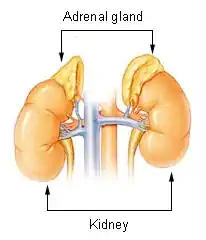Can Adrenal Fatigue Cause Anxiety? What Everyone Ought To Know.

Adrenal fatigue is a condition that has become increasingly common in recent years. It happens when the hormones that control energy production, metabolism, and how the body reacts to stress are out of sync.
People with adrenal fatigue often experience a wide range of symptoms, including anxiety and depression.
In this post, we’ll look at the link between adrenal fatigue and anxiety, and discuss different ways to treat the condition. We’ll also provide tips on how to identify adrenal fatigue early on, and what to do if you find yourself struggling with an ‘always on’ stress response.
Adrenal fatigue: what is it?
In his book Adrenal Fatigue: The 21st Century Stress Syndrome, James Wilson, ND, DC, PhD, who came up with the term “adrenal fatigue,” talks about the adrenals as
“two little glands that sit over your kidneys and are about the size of two large grapes, and weigh about five to eight grams.”
The adrenals play an important role in regulating stress and energy levels.

Cortisol is one hormone made by the adrenals. When we are stressed, our bodies make cortisol and send it into the bloodstream in short bursts.
However, when too much stress happens for a long period of time, this process can become overactivated, leading to high levels of cortisol production and then a burnout of the adrenal glands so they produce eventually too little.
Dr James Wilson refers to this as Adrenal Fatigue Syndrome (AFS).
There isn’t currently any cure for AFS, but there are treatments available that may help improve symptoms.
These treatments include changing your lifestyle, cutting out stressors from work, relationships, and other situations that deplete your resources, doing even light exercise, taking supplements, using natural remedies, and, sometimes, being prescribed medications to treat some of the distressing symptoms of AFS.
Is Adrenal Fatigue a real illness?
There is some debate over whether Adrenal Fatigue Syndrome (AFS) is a true medical condition. This arises because it is a newly identified condition and until recently there were no accepted tests for it.
Medical conditions like chronic fatigue syndrome and irritable bowel syndrome were also thought not to be real illnesses for a long time, but are now widely accepted by medical professionals as genuine health conditions with a scientific basis.
With adrenal fatigue syndrome, professionals’ views are still mixed. However, many physicians and experts do believe it is an actual condition, characterized by fatigue, severe stress and inadequate rest.
It is important to distinguish Adrenal Fatigue Syndrome from Addison’s Disease.
The British National Health Service defines Addison’s disease as:
Addison’s disease, also known as primary adrenal insufficiency or hypoadrenalism, is a rare disorder of the adrenal glands.
The adrenal cortex is damaged in Addison’s disease, causing adrenal dysfunction, so it does not produce enough cortisol or aldosterone. It is one of the autoimmune diseases where the immune response gets confused and the body attacks itself.
Adrenal Fatigue Syndrome is different. Your adrenals are not damaged. They are depleted from emotional stress and physical stress too, leading to adrenal exhaustion.
Addison’s Disease can affect people of any age, but it’s most common between the ages of 30 and 50. Also, women have it more frequently than men.
But Addison’s Disease is rare, with a prevalence of only 0.0013% in the population.
The symptoms overlap with those of Adrenal Fatigue Syndrome. If you feel you might have Addison’s disease, it might be a sensible first step to see a medical professional. To figure out if you have Addison’s or adrenal fatigue, they will probably order blood tests to measure your cortisol output.
DHEA Sulfate tests are used to measure how much of a steroid hormone your body turns into oestrogen and androgens (testosterone). If DHEA levels are low, it could mean that you have Addison’s disease.
If you are experiencing any of these symptoms regularly, like we said, it may be time to seek the advice of your healthcare provider for a cortisol test.
Don’t despair, there is some good news, there are several treatments that can ease your symptoms and improve your life.
Symptoms of Adrenal Fatigue
- decreased energy levels,
- an inability to concentrate,
- low energy
- lack of sleep or falling asleep at odd times
- low libido (sex drive)
- erratic moods and emotions
- joint pain
- out of character snappiness
- body aches and pains
- brain fog
- hair loss
- sleep apnea
- forgetting Things
- rapid weight gain or weight loss
- increased blood pressure
- low blood pressure
This is a long list of symptoms, and you can see why a functional medicine doctor might be skeptical about the existence of a condition that causes everything and its opposite, too.
These symptoms are found in other conditions, and the most common reasons for them are not adrenal fatigue.
Hormones and adrenal glands – What are they and how do they work?
The endocrine system produces hormones. Hormones are substances that your body produces to regulate various functions.
The adrenal glands are found in the upper part of your abdomen, just below your ribcage. They produce a variety of hormones, including cortisol, adrenaline, progesterone, and testosterone.
These are important, but with Adrenal Fatigue, the overproduction of cortisol , and subsequent depletion caused by life-stresses, is the most serious.
Can adrenal fatigue cause anxiety?
Cortisol is necessary and useful. But.
It is a hormone that helps to regulate the body’s reaction to stress and danger. Cortisol regulates blood sugar levels, helps maintain muscle mass during times of caloric restriction or weight loss, modifies the inflammation response throughout the body, maintains general cardiovascular health by reducing heart rate variability (the range between beats), promotes fat storage when food intake is inadequate or calories are consumed from unhealthy sources such as processed foods; finally it aids in cognitive function by enhancing memory recall and mood stability.
Another important gland is the so-called “master gland” — the pituitary gland. When the pituitary gland doesn’t make enough of the hormone ACTH, this may mean the adrenal glands can’t make enough cortisol.
You also need to rule out problems with thyroid as an overactive thyroid gland can make you very anxious.
By managing your stress levels and reducing exposure to stressful situations (e.g., avoiding avoidable high-stress jobs), you can improve your overall health and wellbeing.
The connection between anxiety and adrenal fatigue
There is a connection between cortisol and anxiety, and between depleted levels and when adrenal fatigue sets in. Cortisol has been shown to cause an increase in stress hormones such as adrenaline and noradrenaline, which can lead to an increase in anxiety. High levels of it have also been linked to low levels of enzymes, which are important proteins that are needed for the immune system to work well. This can cause increased susceptibility to infection, decreased immunity, and even chronic inflammation. Illnesses caught this way increase chronic stress, and it becomes a vicious circle.
If Adrenal Fatigue Causes Anxiety, How Can You Treat it?
As we saw, adrenal fatigue can cause anxiety. Here are some general ways to treat anxiety caused by adrenal fatigue:
Exercise:
Endorphins are made when you work out. These chemicals calm the brain and reduce anxiety.
Recommended exercises for people with Adrenal Fatigue include yoga, aerobic workouts like running or cycling, Pilates drills or mat sessions that use props such as balls or resistance bands, aquatic activities like swimming or gentle resistance training using weights you can easily lift.
Psychological Therapies:
Try mediation or cognitive-behavioral therapy (CBT).
CBT is an effective treatment for many mental health issues, including anxiety disorders. It involves teaching patients specific skills, such as how to manage negative thoughts and emotions effectively.
Natural remedies for adrenal fatigue – How do they work and are they safe?
There are several natural remedies available for adrenal fatigue, and they all have their own benefits. Some work by restoring depleted nutrients to the body, while others help restore optimal hormone levels.
Though these remedies are generally safe to use, but it is always advisable to speak with a healthcare professional before starting any new regime. Here are some of the most popular natural remedies for adrenal fatigue:
Green juices:
These drinks provide essential vitamins for times of stress, such as Vitamin C, minerals, amino acids, and antioxidants that can help improve energy levels and restore balance in the body’s hormones. Add fresh fruits and vegetables to your blender and enjoy as is or add omega-3 fatty acids for an extra boost.
Exercise:
Physical activity has many benefits beyond simply helping you lose weight. It can also reduce symptoms of stress and anxiety, improve moods, increase cognitive function, promote better sleep habits, and downregulate an overstimulated nervous system, help with insulin levels and insulin resistance. The list of benefits goes on! Getting active doesn’t need to be strenuous – even 10 minutes Walk/jog around the block will do the trick!
Essential oils:
A variety of essential oils may be helpful in treating Adrenal Fatigue syndrome (AFS).
Essential oils you can try are:
- lavender oil,
- frankincense oil,
- geranium oil,
- peppermint oil,
- chamomile extract, melatonin.
- Clary sage,
- bergamot,
- and citrus oils can help (e.g. grapefruit and lime).
Nutritional Supplements for adrenal fatigue
There are several supplements that have been shown to help improve adrenal function and reduce the symptoms of adrenal fatigue. Some of the most commonly recommended supplements include:
1. magnesium
Magnesium has many important jobs in the body, like helping muscles and nerves work and making energy.
Researchers have found that magnesium may help the brain work in ways that make people feel less stressed and anxious.
Most adults can take up to 350 mg per day without getting sick. People take a lot more, but be aware that some people might get stomachaches, nausea, vomiting, diarrhoea, and other side effects when they take too much magnesium.
2. Omega-3 fatty acids
These essential fats help improve overall mood, cognitive function, and joint health. They can also help increase energy levels and reduce inflammation. Regularly taking omega-3s has been shown to help support the adrenal glands and treat the symptoms of adrenal fatigue. Recommended doses vary based on weight and diet, but typically start small (e.g., 1 gram per day) and gradually increase over time as needed.
3. Vitamin B12
B vitamins are often deficient in people with Adrenal Fatigue Syndrome (AFS). Deficiencies in B12 lead to impaired nerve function, brain fog, poor sleep quality/restful sleep cycles, reduced appetite control/weight loss struggles, mood swings/anxiety attacks. Adding B12 supplementation to your treatment plan may help improve symptoms significantly.
4. Chromium
This mineral helps the body use insulin more effectively. Taking chromium supplements may also help people with AFS think more clearly and concentrate better.
If you consume lots of chromium, it can damage your lungs, heart, stomach, liver, kidneys, and other organs, and it could even kill you. Chromium may cause asthma in people who are already sensitive to it.
Nootropics for adrenal fatigue — are they effective and safe?
Nootropics are a type of supplement that is said to improve cognitive function and boost energy levels.
Adaptogens are things like herbs and mushrooms that help the body stay in balance and heal itself.
Some adaptogenic herbs stimulate the body and improve mental performance, while others help calm the body and calm the adrenals.
1. Ashwagandha
Ashwagandha is known for its calming and healing effects. It supports the nervous and endocrine systems and helps the body’s natural sleep cycle.
2. Rhodiola Rosea
As an adrenal adaptogen, Siberian Rhodiola rosea helps the adrenal glands work well and helps people deal with stress in a healthy way. Read my article about when I tried it.
3. Holy basil (Tulsi)
Holy Basil helps you deal with stress in a healthy way by feeding your mind and lifting your spirit.
4. Eleuthero (Siberian Ginseng)
Eleuthero is used to support mental alertness, performance, and concentration, reduce stress, and help keep healthy energy and stamina.
5. Schisandra
Schisandra berries are considered a balancing tonic and a popular adaptogenic herb. They have a mix of five different flavours that correspond to the five phases or Elements of Traditional Chinese Medicine: sour (wood), bitter (fire), sweet (earth), acrid (metal), and salty (Water).
Scientifically, not much is known about how well and safely these supplements work for adrenal fatigue. However, some people believe they may be helpful in treating this condition.
What Medication is Prescribed for Adrenal Fatigue and What Are The Side Effects?
There is no single medication that can help treat adrenal fatigue. However, some physicians may prescribe for adrenal fatigue and may consider including hydrocortisone and cortisol, both of which are steroid hormones.
Cortisol can be replaced with either hydrocortisone, prednisone, or methylprednisolone.
These hormones are given on a schedule to mimic how levels change naturally over a 24-hour period.
If you take this medication, you will need a lot of salt (sodium) in your diet, especially if you work out a lot, as they deplete the sodium in your body.
Some of the side effects of these drugs are an increased appetite, weight gain, trouble sleeping, mood swings, and a lack of feelings. Before you start treatment, talk to your doctor about any potential side effects. This will help you avoid problems.
Here are 8 tips to help improve your symptoms of adrenal fatigue:
- Establish healthy sleep habits, including enough restorative sleep
- Eat healthy foods that are high in antioxidants and vitamins A & E. Include healthy fats, reduce salty foods (though, as mentioned above, salt is also important in your diet.)
- Stop overusing alcohol
- Stay hydrated.
- Consider Epsom salt baths instead of showers because they provide deep relaxation and you absorb the relaxing mineral magnesium through your skin.
- Reduce or eliminate caffeine consumption. Caffeine has been shown to worsen adrenal conditions. It’s also important to avoid drinking large amounts of coffee throughout the day; instead, stick to small doses several times a day.
- Increase your intake of antioxidants and vitamins A, & E. This will avoid nutritional deficiencies.
- Avoid smoking tobacco or marijuana. Smoking significantly contributes to increased cortisol levels.
- Exercise regularly. Regular physical activity has multiple benefits for overall well-being, including reducing anxiety, improving moods, and decreasing blood pressure.
Conclusion
Can adrenal fatigue cause anxiety? It seems it can. From the symptoms to the treatment, adrenal fatigue is a serious issue that can lead to both physical and mental disorders. This can include serious anxiety and panic attacks.
Now that you know what it is and how to recognize it, you are ready for the next step—getting better.
To make this process easier, just keep remembering these tips. This might mean lifestyle changes, and changes to your daily routine, but adrenal fatigue might be telling you that those are absolutely necessary. Don’t ignore its alarm bell.
Always remember to keep an eye on your stress management and take a rest from stressful situations.
- Be sure not to miss your sleep.
- Focus on staying hydrated
- Exercise regularly — even light regular exercise — instead of sitting at home all day. |
- Finally, don’t be afraid of medication if it is necessary.
Look after your adrenal health! Begin your road to recovery today.






